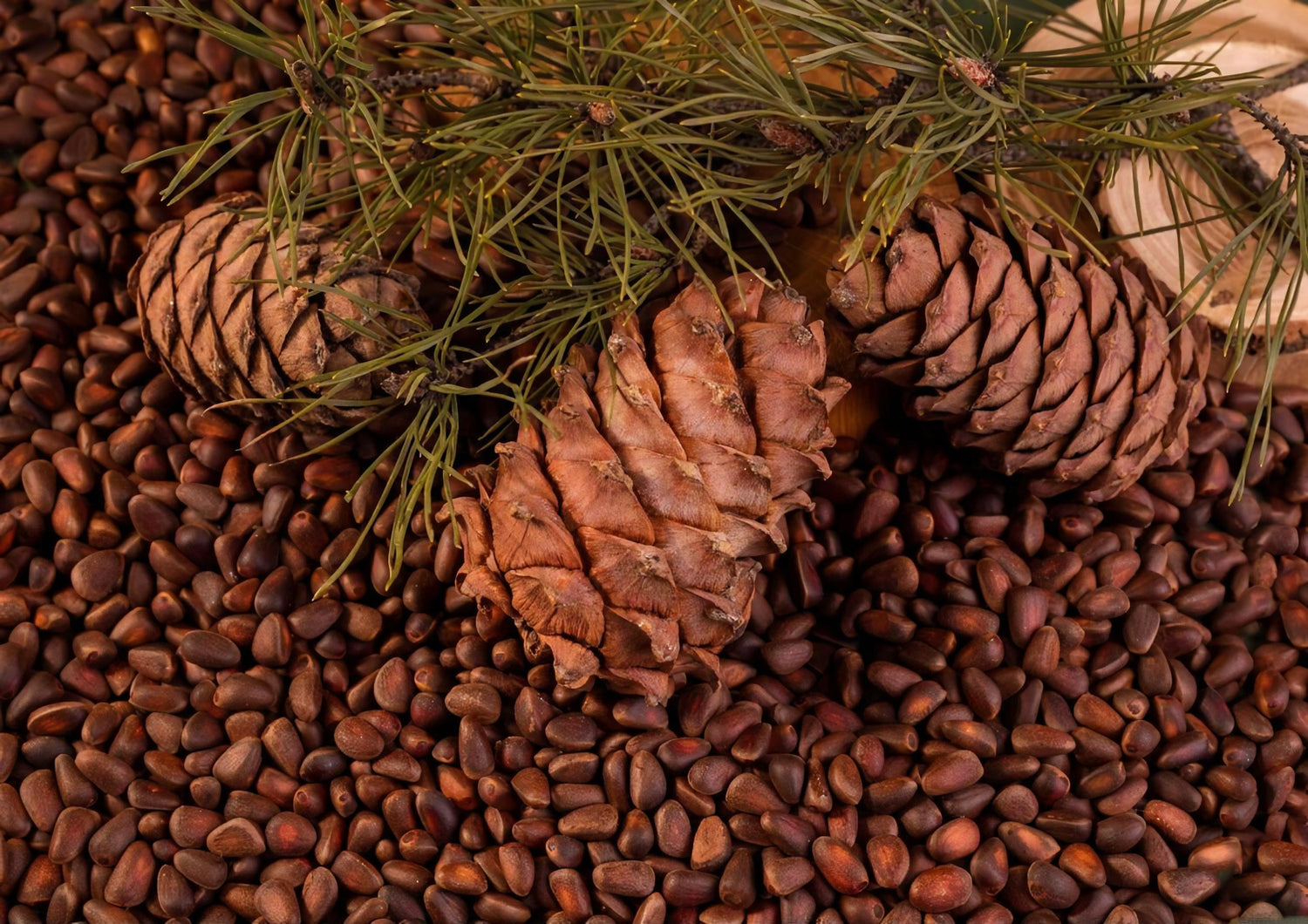The contents of this article are summarized from this source: https://pmc.ncbi.nlm.nih.gov/articles/PMC9861571/
Pinolenic acid (PNLA), a unique fatty acid found in pine nuts, is gaining attention for its wide-ranging health benefits, particularly its anti-inflammatory and metabolic effects.
Siberian cedar oil, extracted from the nuts of Pinus sibirica, stands out as one of the richest natural sources of PNLA, offering a sustainable alternative to marine-derived omega-3s.
Here’s a breakdown of its key benefits and how Siberian cedar oil delivers this powerful compound.
What Makes Siberian Cedar Oil Special?
Siberian cedar oil is packed with 45–65% oil by weight, with PNLA making up up to 27% of its fatty acids—far higher than other pine species like P. pinea (which has negligible PNLA). This oil also contains:
- Linoleic acid (48.4%), a polyunsaturated fat linked to heart health.
- Oleic acid (24%), a monounsaturated fat known for supporting cholesterol balance.
- Antioxidants like tocopherols and phytosterols, which combat oxidative stress.
This unique composition makes Siberian cedar oil a standout for delivering PNLA’s health benefits, which are backed by preclinical and human studies.
Fighting Inflammation: PNLA’s Superpower
PNLA tackles inflammation through multiple pathways, making it promising for conditions like arthritis and heart disease:
1. Calming Immune Overactivity
- In lab studies: PNLA reduced inflammatory markers like IL-6 (by 71%) and TNF-α (by 27%) in immune cells [1]. It also lowered PGE2, a pain-signaling molecule, by 89% [1].
- In animals: Rats given Siberian cedar oil saw 45% less swelling in inflamed paws and reduced fever [1]. Topical PNLA also reduced immune cell infiltration by 63% in skin irritation models [1].
- In humans: Immune cells from rheumatoid arthritis patients showed 60% lower TNF-α and IL-6 levels after PNLA treatment [1].
2. Targeting Inflammation at the Source
PNLA works by:
- Blocking NF-κB, a key inflammation trigger, reducing its activity by 50% in blood vessel cells [1].
- Activating PPARs, proteins that regulate genes involved in metabolism and inflammation [1].
- Inhibiting STAT proteins, which drive immune cell migration and fat uptake in arteries [1].
Antioxidant Protection
PNLA helps neutralize harmful free radicals and supports the body’s natural defenses:
- Reduced intracellular oxidative stress by 65.5% in liver cells [1].
- Boosted production of protective enzymes like heme oxygenase-1 (HO-1) [1].
- Protected mitochondria in immune cells, lowering stress linked to chronic diseases [1].
Heart Health and Cholesterol Support
Siberian cedar oil’s PNLA promotes healthier lipid profiles and combats artery clogging:
- Lowered triglycerides by 26% in high-fat diet models [1].
- Reduced oxidized LDL uptake by 40% in immune cells, slowing plaque formation [1].
- Enhanced liver clearance of LDL cholesterol through ApoA-I modulation [1].
Metabolic Benefits: Weight and Blood Sugar
PNLA shows promise for metabolic health:
- Appetite control: Human trials noted reduced hunger and body fat, likely due to PNLA’s effect on gut hormones [1].
- Blood sugar balance: Improved glucose tolerance in mice by activating receptors (FFA1/FFA4) targeted by diabetes medications [1].
- Fat storage: Suppressed liver fat synthesis genes (ACSL3/4) by 30%, reducing fatty liver risk [1].
Safety and Sustainability
- No toxicity: Animal studies found no liver damage even at high doses [1].
- Eco-friendly: Siberian cedar oil offers a plant-based PNLA source, avoiding over-reliance on declining fish stocks [1].
The Bottom Line
Siberian cedar oil’s high PNLA content makes it a versatile supplement for tackling inflammation, oxidative stress, and metabolic issues. While human trials are still needed to confirm optimal dosing, existing research highlights its potential as a natural therapy for conditions like arthritis, heart disease, and diabetes. For eco-conscious consumers, it’s a sustainable choice that doesn’t compromise on science-backed benefits.





Leave a comment
This site is protected by hCaptcha and the hCaptcha Privacy Policy and Terms of Service apply.